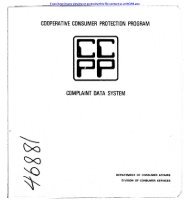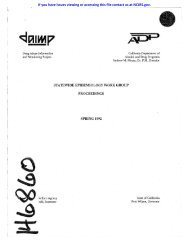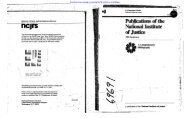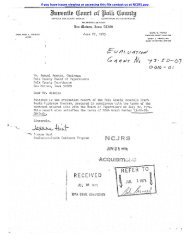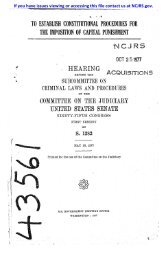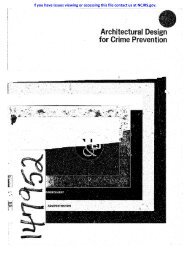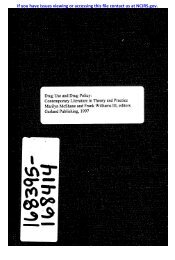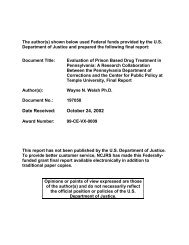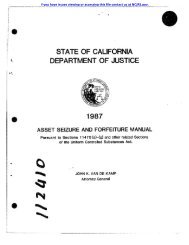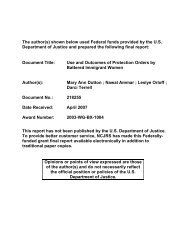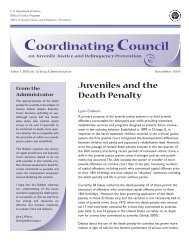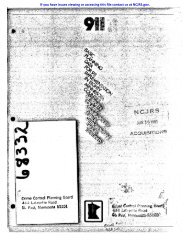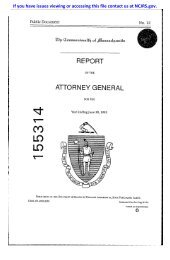Conflict Resolution Education - National Criminal Justice Reference ...
Conflict Resolution Education - National Criminal Justice Reference ...
Conflict Resolution Education - National Criminal Justice Reference ...
You also want an ePaper? Increase the reach of your titles
YUMPU automatically turns print PDFs into web optimized ePapers that Google loves.
Parent Involvement<br />
Parent involvement in and support for a schoolbased<br />
conflict resolution program is critical. PEF’s<br />
text Fighting Fair for Families offers families a chance<br />
to reinforce conflict resolution at home. 4 The text<br />
covers communication skills, anger management<br />
techniques, and basic mediation skills in English,<br />
Spanish, French, and Haitian Creole.<br />
PEF has devised a variety of implementation models<br />
that can be used in a classroom, school, or school<br />
district. PEF conflict resolution components may<br />
be incorporated into traditional academic lessons.<br />
In addition, the conflict resolution components or<br />
specific PEF curriculum lessons may be taught with<br />
subject areas. Drop Everything for Peace is a PEF<br />
approach that sets aside time on a regular basis to<br />
teach only PEF components and curriculums.<br />
<strong>National</strong> Institute for Citizen<br />
<strong>Education</strong> in the Law<br />
To promote cooperation instead of competition, the<br />
<strong>National</strong> Institute for Citizen <strong>Education</strong> in the Law<br />
(NICEL), a grantee of the Office of Juvenile <strong>Justice</strong><br />
and Delinquency Prevention (OJJDP), has<br />
interwoven strategies for conflict management and<br />
mediation into many of its programs and curriculum<br />
materials. NICEL’s text Street Law: A Course in Practical<br />
Law is used in schools, juvenile justice settings,<br />
and communities nationwide and has been adapted<br />
for use in other countries. 5<br />
Middle and High School Programs and<br />
Curricular Materials<br />
In 1985, NICEL, in partnership with the <strong>National</strong><br />
Crime Prevention Council (NCPC), formed the<br />
Teens, Crime, and the Community (TCC) program,<br />
which is funded by OJJDP. The TCC program<br />
helps teens understand how crime affects them<br />
and their families, friends, and communities, and<br />
involves them in a service focused on making their<br />
communities safer. <strong>Conflict</strong> management lessons<br />
are a key student activity. This program includes<br />
19<br />
I learned how to keep calm and keep the<br />
disputants calm—to help them solve their<br />
problems and not to solve the problem for<br />
them.<br />
Student, North Carolina<br />
comprehensive program design, teacher and community<br />
resource training and preparation, and<br />
student and teacher materials development.<br />
With funding from OJJDP, NICEL and NCPC<br />
produced conflict resolution education curriculums<br />
designed for specific student audiences: We Can<br />
Work It Out! Problem Solving Through Mediation<br />
(elementary and secondary school editions) and<br />
The <strong>Conflict</strong> Zoo. We Can Work It Out! Problem Solving<br />
Through Mediation for secondary schools involves a<br />
step-by-step design to teach the skills of personal<br />
conflict management and the process of mediation. 6<br />
Through these lessons, teachers can impart valuable<br />
skills in analytical reasoning, active listening, patience,<br />
empathy, and generating opinions. The curriculum<br />
teaches students key terms and concepts<br />
and allows them to learn experientially. Students<br />
apply the skills they learn in scenarios in which<br />
they assume the roles of disputants and mediators.<br />
An outgrowth of We Can Work It Out! is the Mediation<br />
Showcase. NICEL, in partnership with the<br />
<strong>National</strong> Institute for Dispute <strong>Resolution</strong> (NIDR),<br />
designed mediation showcases to popularize conflict<br />
management skills. At these showcases, students<br />
are given conflict scenarios where they role-play<br />
the disputants and mediators. Community resource<br />
people, including community mediators and other<br />
volunteers who use skills involved in conflict management,<br />
provide feedback to the students on their<br />
ability to resolve the conflicts presented to them.<br />
This forum provides an opportunity for students<br />
to celebrate their newly learned skills and interact<br />
with adults in a constructive and affirming environment.<br />
In turn, these events provide an excellent<br />
opportunity for authentic assessment.



